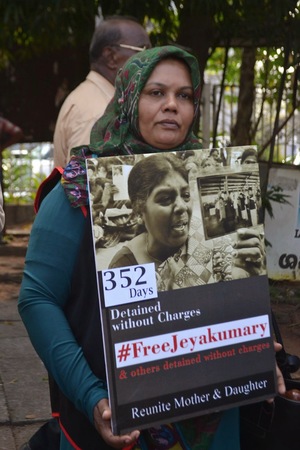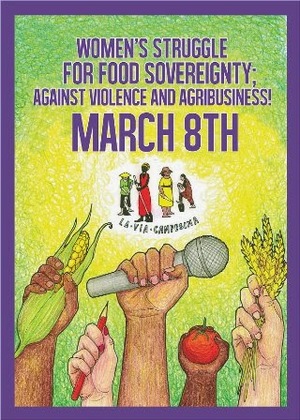On the International Women’s Day, La Via Campesina South Asia issued a call for gender justice:
Women of the World, Unite! Farmer, adivasi, pastoralist, and landless women – defend your rights! Without organized women, there can be no agroecology, no agrarian reform, no food sovereignty! We struggle against violence and agribusiness!
For the full international call, please click here.
Rural women of the world, unite!
Though word “farmer” is gender neutral, when people think of farmers, they automatically picture men. This is so internalized that we have to specify “women farmers” to address the significant half of ‘the farming world’. The blindness to women in agriculture goes beyond language; the visible-invisible contribution of women in the agriculture sector and rural society is completely neglected. Members of LVC South Asia take this day as an opportunity to share the realities of rural women in each of our areas – farmers facing sexual violence in North India, religious fundamentalism in Bangladesh, and militarism in Sri Lanka.
North India – Bharatiya Kisan Union
Ms. Ketki Singh of the Bhartiya Kisan Union says, “About 80% of the workforce on farms are women but their work is not recognized and has no quantified value. Women have no rights and are given no respect for their work either on the field or in the household.
Homemakers enable the family members to step out by catering to the household responsibilities, something never acknowledged. Further, sometimes farmers work from dawn to dusk under very harsh weather conditions, and women farmers are not able to properly take care of young children nor their own needs.”
Rural young girls may end up dropping out from schools or, even worse, are never enrolled in schools because they are free (wo)manpower. Ms. Ketki Singh said, “I come across such women farmers and girls who face sexual harassment and exploitation when they go out to relieve themselves in the fields or while they are doing farm work. Even so, they are forced to go out every day at odd hours. They become more susceptible to abuse when people are aware that the woman has no male in the family. Even women exploit women and leave no opportunity to use her vulnerable situation to make profit.”
She also insists on the fact that women farmers need not reject men; all they need is recognition for their work. Women need to get aware of pro-women legislation and not be victim to poor implementation mechanisms or social stigmatization for asserting their right to justice.
“Enough is enough! The need of the hour is to fight for our rightful place in the society and that we should not bow down to any form of oppression. Let’s pledge to raise our voice against gender discrimination and fight for equal status as men!” – Ketki Singh
Sri Lanka– MONLAR (full report to be published later) 
In the aftershocks of the war which ended in 2009, rural women are still in the process of combating the militarism which pervades their everyday lives. There are nearly 90,000 war widows in North and Eastern Sri Lanka, 12,000 of whom are young widows. 40,000 female-headed households are particularly vulnerable tosexual harassment, exploitation and assault. Many households are living in refugee camps where sanitation and health facilities are severely affecting their well-being, as well as further damaging their psychological stability.
Many kinds of violence are carried out on women through militarization in Sri Lanka.
First, they face barriers to agricultural work and threats to their economic security. In Periya Ullai (in Ampara) women complained that even to enter their own fields they are required to sign in and out with the military and certain areas that belong to the community have been barred under the claim of finding archaeological “treasures”. Women used to guard their fields at night however now due to military presence this is no longer viable. Many women’s livelihoods in this area have been agriculture and collecting and selling firewood. All these activities have been banned by military men.
Land grab is displacing farmers from their source of livelihood. In Vattakachchi land has been taken by the military for farming and people have been employed in the same. In several areas the military has been engaging in farming and selling of vegetables and fruits which has curbed women’s access to economic ventures such as running small shops, growing vegetables and farming. In many areas lands belonging either through permit or title deeds to women continue to be taken away by the forest and the archeological departments. Military has influenced the civil administration and in some cases gone against the district court verdicts in their effort to continue their occupation of people’s land.
There are cases of sexual abuse by the military, which rarely find justice. Women are unable to travel for court, and court proceedings are usually held in a language they do not know.Similarly, when women file Habeaus Corpus applications in relation to their missing and loved ones, the justice system drags its feet.
Women are also being criminalized by the military without base. A group of women from families of surrenders gathered for prayer at Killinochchi Murugan Kovil and CID and military surrounded them.The organizer and a few other women were interrogated later. To date these women have been carefully watched by the CID and a month ago the military walked into their meeting and tried to obstruct it.
“We demand justice for women and the realization of their economic, social and cultural rights! We demand an end to sexual violence against women, and return of lands grabbed by the military!”
Bangladesh – Bangladesh Krishok Federation
Though women as a whole have great contribution to the national economy that is not officially counted, Bangladesh is a country dominated by patriarchy, where women are viewed and treated as inferior to men. In Bangladesh, women face many kinds of violence: religious violence, domestic violence, sexual abuse, human trafficking, child marriage, polygamy, dowry system, etc.
Many Muslim women endure violence as a result conservative forces within Bangladesh and conservative, male-dominated family structures. For example, according to the Fatuah of Muslim religious leaders, women should not come outside the house, should not work in the office, should not study past class four, etc. From childhood, women are taught that heaven is at the feet of her husband, so she should abide by his repression. Domestic violence, though common (in all religious communities), is quite invisible and survivors rarely receive justice. Women also face harassment in the workplace.
The fight for land rights for women is ongoing in Bangladesh. Women’s right to land is key for her financial security and autonomy. As per Muslim Shariah law, daughters get half of what the son gets from the family land property. In Bangladesh, few years back, a policy was declared by the government to protect the rights of women, including the provision of the equal right to paternal property. It was extremely protested by religious fundamentalists, who use religion as a mask to their chauvinism.
“It is our task as members of a secular society to defend against religious fundamentalism – a strong force of oppression for women in Bangladesh and beyond!”
